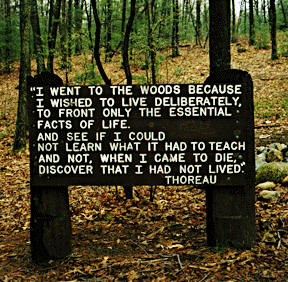Brought to you by Peet's Dark Roast...
This is actually the second installment of my Grand Unified Theory series, as I inch up to my thesis. As soon as I figure out what it is. I have this sense that if I'm going to take my place among great social thinkers, such as Henry David Thoreau (Walden), Joseph Tainter (Marginal Utility), Emile Durkheim (Organic Society, Anomie), Sigmund Freud (Civilization & Its Discontents), and Craig Dilworth (Vicious Circle Principle) and I'm probably not...then I need to come up with a seminal idea. And I think what I've been ruminating on all these years without really realizing it is the interesting question: why is it that human beings, as a species, are constitutionally incapable, as a group, of reacting rationally to existential threats to their own viability?
You gotta admit: it's a grabber. When I say, "react rationally," what I mean is, why can't human beings simply assess a dire problem, such as global warming, and set about solving it in a systematic fashion? I believe it could be done, with effective communication and leadership. I realize that the bell curve of human intelligence will always be such that about 80% of the human populace cannot grasp, in a comprehensive way, the intricacies of the problem itself. It remains for the remaining 20% or so to show the way forward. One immediate paradox is that the same bell curve distribution, in a democracy, produces the "leadership" that is supposed to show the way forward. As a result, we wind up with empty suits like Barack Obama, full of smiles and conciliatory gestures towards one and all, but with absolutely no effective leadership and no resolve. A kind of one-headed Zaphod Beeblebrox, for you Douglas Adams fans out there.
It was probably such a paradox that convinced the ancient Greek philosophers, probably the smartest human beings who ever graced the surface of the Earth, that democracy (though they invented it - it's a Greek word, after all) had its severe limitations, and that human groups were probably best led by a well-intentioned Philosopher King.
Asking a stupid entity such as a democracy to make intelligent decisions based on highly technical details is a contradiction in terms. That may be the first plank of my thesis.
It leads to other conclusions, such as the utter futility of acts of self-martyrdom, such as I was writing about yesterday when commenting on Guy McPherson's assessment of his own huge "mistake" in leaving his academic life and taking up residence in the "mud hut" of the Sonoran Desert. I think he's absolutely right: he made a huge mistake. The eensy-weensy, tiny-tiny, virtually-invisible rounding-error contribution such a lifestyle makes to the overall problem of global warming or resource depletion is a joke. Really, what such an act of self-abnegation amounts to is simply narcissism by another route. Look at me! I live consistently with my principles!
Good for you. And yet all of these spokespeople for ultra-simplicity, Guy McPherson, Dmitry Orlov, James Kunstler, routinely board jumbo jets and fly all over the country, or the world, and deliver their dire warnings after paying for the jet exhaust that has just wreaked havoc on the ozone level and dumped vast amounts of CO2 right at the level of the troposphere where it can do the most harm.
Dmitry Orlov doesn't actually parade his decision to live on a boat as any sort of virtuous decision, in point of fact. He just likes boats and sailing, and he doesn't like work. He enjoys the "broad margin" to his life that such simplicity allows, along the lines extolled by another Massachusetts resident, Henry David Thoreau. Thoreau, indeed, is a very useful example of the pointlessness of self-martyrdom. Contrary to the (80%) view that Thoreau lived in a shack beside a pond his entire life, Thoreau lived in many places during his brief years, and devoted only 26 months to the cabin he built next to Walden Pond. He then, as he said, became again "a sojourner among mankind."
A sojourner among mankind is what we all actually are, and we are all, to one degree or another, participants in modern civilization.
Anyway, a plank for the thesis has been laid. My deep gratitude to the makers of such fine coffee this blue and fleecy white morning, here among the trees.
The video embedded below, along with the draft script and supporting links,
can be freely viewed on the Nature Bats Last Substack account. Comments are
ena...
2 days ago




